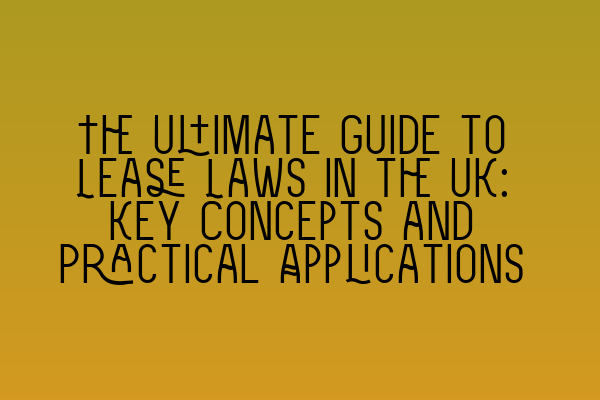The Ultimate Guide to Lease Laws in the UK: Key Concepts and Practical Applications
Welcome to the ultimate guide to lease laws in the UK! Whether you’re a property owner, tenant, or aspiring solicitor specializing in property law, this comprehensive guide will provide you with the key concepts and practical applications of lease laws.
Understanding Lease Laws
Lease laws in the UK govern the legal relationship between landlords and tenants. A lease is a contractual agreement that grants a tenant the right to occupy and use a property for a specified period of time. It outlines the rights and responsibilities of both parties, ensuring a fair and transparent arrangement.
Lease laws encompass a wide range of issues, including rent, repairs, alterations, subletting, termination, and more. Understanding these concepts is vital for anyone involved in the property industry to ensure compliance with the law.
Key Concepts in Lease Laws
1. Rent
Rent is a fundamental aspect of any lease agreement. It is the payment made by the tenant to the landlord in exchange for the use and occupation of the property. Rent amounts and payment terms are typically set out in the lease agreement.
For a deeper understanding of the intricacies of rent in lease laws, check out our SQE 1 Practice Exam Questions article.
2. Repairs and Maintenance
Both landlords and tenants have responsibilities when it comes to repairs and maintenance. The lease agreement should clearly outline who is responsible for various aspects, such as structural repairs, general maintenance, and appliance upkeep.
To test your knowledge on repairs and maintenance in lease laws, try our SQE 1 Practice Mocks FLK1 FLK2 quiz.
3. Alterations and Improvements
Tenants may wish to make alterations or improvements to the property during the lease term. Lease laws stipulate the conditions and procedures for such changes. Landlords typically require written consent and may impose restrictions or require the tenant to restore the property to its original state at the end of the lease.
4. Subletting and Assignment
In certain situations, tenants may wish to sublet all or part of the leased property or assign their lease to another party. Lease laws dictate the conditions under which subletting and assignment are allowed, often requiring the landlord’s consent being obtained beforehand.
Practical Applications of Lease Laws
Now that we’ve covered the key concepts, let’s explore some practical applications of lease laws in the UK.
1. Residential Leases
Residential leases are the most common type and involve the leasing of residential properties, such as houses and apartments, to individuals or families for residential purposes. Lease laws provide protection for both tenants and landlords, ensuring fair and equitable lease agreements.
2. Commercial Leases
Commercial leases apply to properties used for business purposes, such as offices, shops, and warehouses. Lease laws governing commercial leases often differ from residential lease laws due to the unique nature of commercial leases, including factors like rent reviews, business rates, and obligations for maintaining the property for business use.
If you’re interested in specializing in commercial leases, our SQE 2 Preparation Courses can provide you with the knowledge and skills you need.
3. Lease Extensions and Renewals
Lease laws also encompass lease extensions and renewals. These occur when the original lease term is coming to an end, and both parties agree to extend the lease or enter into a new lease agreement. Understanding the legal requirements and procedures for lease extensions and renewals is crucial for both landlords and tenants.
For more information on preparing for lease extensions and renewals, our SQE 1 Preparation Courses can provide you with valuable insights.
Stay Informed and Compliant
Lease laws are constantly evolving, and it’s essential to stay informed to ensure compliance. Familiarize yourself with the SRA SQE Exam Dates, as passing the SQE exams is a crucial step towards becoming a qualified solicitor specializing in property law.
By understanding the key concepts and practical applications of lease laws in the UK, you can confidently navigate the complexities of lease agreements and protect the rights of tenants and landlords alike.
If you have any questions or require legal advice regarding lease laws, our expert solicitors at SQE Property Law & Land Law are here to assist you.
Disclaimer: The information provided in this article is for general informational purposes only and does not constitute legal advice. For personalized advice, please consult a qualified solicitor.
